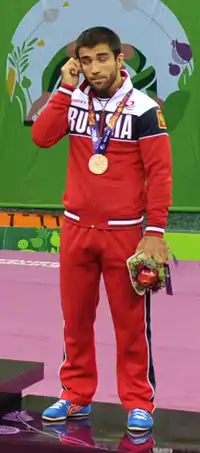Ilyas Bekbulatov
Ilyas Idrisovich Bekbulatov (Kumyk: Ilyas Bekbulat Idrisni ulanı; Russian: Ильяс Идрисович Бекбулатов; born 12 August 1990 in Dagestan) is a Russian-Uzbekistani freestyle wrestler of Kumyk ethnicity, who won the gold medal at the 2017 European Wrestling Championships. He also won bronze at the first 2015 European Games. Bekbulatov is a four-times Ivan Yarygin Grand-Prix winner. He was the first who beat American undefeated wrestler Brent Metcalf. He is International Master of Sports in freestyle wrestling.[1] Asian champion 2020.
 Bekbulatov in 2015 | |||||||||||||||||||||||||||||||||||||||||||||||||||||||||||||||||||||||||||||||||||||||||
| Personal information | |||||||||||||||||||||||||||||||||||||||||||||||||||||||||||||||||||||||||||||||||||||||||
|---|---|---|---|---|---|---|---|---|---|---|---|---|---|---|---|---|---|---|---|---|---|---|---|---|---|---|---|---|---|---|---|---|---|---|---|---|---|---|---|---|---|---|---|---|---|---|---|---|---|---|---|---|---|---|---|---|---|---|---|---|---|---|---|---|---|---|---|---|---|---|---|---|---|---|---|---|---|---|---|---|---|---|---|---|---|---|---|---|---|
| Native name | Ильяс Бекбулатов | ||||||||||||||||||||||||||||||||||||||||||||||||||||||||||||||||||||||||||||||||||||||||
| Full name | Ilyas Idrisovich Bekbulatov | ||||||||||||||||||||||||||||||||||||||||||||||||||||||||||||||||||||||||||||||||||||||||
| National team | |||||||||||||||||||||||||||||||||||||||||||||||||||||||||||||||||||||||||||||||||||||||||
| Born | August 12, 1990 Kayakent, Dagestan, Russia | ||||||||||||||||||||||||||||||||||||||||||||||||||||||||||||||||||||||||||||||||||||||||
| Height | 1.65 m (5 ft 5 in) | ||||||||||||||||||||||||||||||||||||||||||||||||||||||||||||||||||||||||||||||||||||||||
| Weight | 65 kg (143 lb) 70 kg (154 lb) | ||||||||||||||||||||||||||||||||||||||||||||||||||||||||||||||||||||||||||||||||||||||||
| Sport | |||||||||||||||||||||||||||||||||||||||||||||||||||||||||||||||||||||||||||||||||||||||||
| Sport | Wrestling | ||||||||||||||||||||||||||||||||||||||||||||||||||||||||||||||||||||||||||||||||||||||||
| Event(s) | Freestyle | ||||||||||||||||||||||||||||||||||||||||||||||||||||||||||||||||||||||||||||||||||||||||
| Club | Kayakent wrestling club | ||||||||||||||||||||||||||||||||||||||||||||||||||||||||||||||||||||||||||||||||||||||||
| Coached by | Magomed Magomedov, Gaidar Gaidarov | ||||||||||||||||||||||||||||||||||||||||||||||||||||||||||||||||||||||||||||||||||||||||
Medal record
| |||||||||||||||||||||||||||||||||||||||||||||||||||||||||||||||||||||||||||||||||||||||||
He is nicknamed "Erkek" (English: Tough Man) and "Kumyk Nightmare".
Biography and career
Bekbulatov was born in 1990 in the village of Kayakent, Dagestan, Soviet Union. He belongs to the Kumyk ethnic group. Bekbulatov won the Junior Russian Freestyle Wrestling Championships in 2007 and became silver medalist in the next year. He then became Russian National Student Wrestling Champion in 2011.[2] On 8 May 2015, Bekbulatov became Russian freestyle wrestling national champion in the category 65 kg, defeating World Champion Soslan Ramonov in the final match.[3] At the 2015 European Games, Bekbulatov faced Olympic champion Toghrul Asgarov and lost via decision (7-8), but went on win a bronze medal against Belarusian Azamat Nurykau.[4]
At the 2017 European Wrestling Championships, he won all matches by technical superiority.[5]
Championships and achievements
- Senior Level
- 2012 Ali Aliyev Memorial Champion – 66 kg
- 2012 Golden Grand Prix Baku: Memorial Heydar Aliyev Bronze Medalist – 66 kg
- 2012 Intercontinental Cup Bronze Medalist – 66 kg
- 2013 Golden Grand Prix Baku: Memorial Heydar Aliyev Champion – 65 kg
- 2013 European Championships Bronze Medalist – 66 kg
- 2013 Russian National Bronze Medalist – 66 kg
- 2014 Ramzan Kadyrov & Adlan Varayev Cup Winner – 65 kg
- 2014, 2015 Golden Grand Prix Ivan Yarygin Champion – 65 kg
- 2015 Russian National Champion – 65 kg
- 2015 European Games Bronze Medalist – 65 kg
- 2016 World Cup silver medalist – 65 kg[6]
- 2016 Intercontinental Cup winner – 65 kg
- 2017 European Championships – 65 kg
- 2018 Dan Kolov & Nikola Petrov winner – 70 kg
- 2018 European Championships Silver Medalist – 65 kg
- 2020 Yasar Daogu – 70 kg
- 2020 Asian Championships – 70 kg
- Junior Level
- 2007 Russian Junior National Champion – 66 kg
- 2007 Cadet European Champion
- 2008 Junior European Championships Silver Medalist
- 2008, 2011 Russian National Student Wrestling Champion – 66 kg
References
- "Bekbulatov bio". wrestdag.ru. June 7, 2014.
- "Bekbulatov is national champ". wrestrus.ru. June 7, 2014.
- "Bekbulatov took revenge for all wrestlers". wrestrus.ru. May 8, 2015.
- "Ilyas Bekbulatov won bronze medal in first European Games". sovsport.ru. June 17, 2015.
- "Ilyas Bekbulatov is European champion". championat.com. May 3, 2017.
- "Molinaro, Green and Snyder go undefeated as U.S. finishes fourth at Freestyle World Cup". teamusa.org. June 12, 2016.